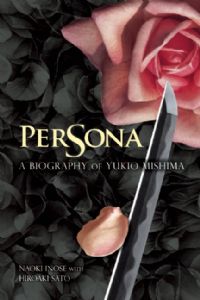Persona, a newly-released English translation of Yukio Mishima’s biography.
 Persona: A Biography of Yukio Mishima
Persona: A Biography of Yukio Mishima
by Naoki Inose and Hiroaki Sato
Stone Bridge Press, January 2013
864 pages / $39.95 Buy from Stone Bridge Press or Amazon
“Perfect purity is possible if you turn your life into a line of poetry written with a splash of blood.” – Yukio Mishima, Runaway Horses
This review—or my interest in the new Yukio Mishima biography Persona coming out from Stone Bridge Press and in Mishima himself—began as these things often do, in a coffee shop with a like-minded friend discussing the rather awesome notion that Japan has a forest devoted almost entirely to suicide. The Aokigahara has associations both with Japanese demonology, and suicide primarily as it’s the second-most popular place on earth to end it all; falling behind in rank to San Francisco’s Golden Gate Bridge. I believe the conversation started out discussing the Foxconn suicides and sort of snowballed from there, until mention of Akira Kurosawa’s attempt after the commercial failure of his Dodes’ka-den by me led to my friend’s mention of Yukio Mishima. Unlike Kurosawa, Mishima actually finished the job, committing the ritual act of Seppuku after a failed coup when he was only 45.
I’ve always been attracted to stories like this, as many people—I think–are. Suicide, homicide, sudden outbursts of lunacy by the likes of Jackson Pollock or Norman Mailer have always had a nostalgic twinge for me and I decided then to pursue Mishima’s fiction. The Temple of the Golden Pavilion, probably my favorite of Mishima’s books, holds a similar allure to Kurosawa’s cinema, being as it is a contemporary art form describing events long ago made history. His sense of minimalism and terse descriptions of landscapes, conversations, friendships, and the mythological air of Japan in 1400 is like nothing I’ve ever read, and when word of Persona came round, I was certain I had to review it.
I’ve come to expect biographies to fall into two categories if they are in the first place good, or well-written. The first would be relegated to public figures who did not in their lifetime write a great deal or put out some form of art or conversation and hence the biographies tend to concern themselves with familial goings-on, schooling and at-length descriptions of important/pivotal events, and attempted portraits of physical moments in the biographee’s life to create something that’s readable, and fits into the mandates of a narrative the public can enjoy/become informed from. The second is for everyone else; the artists, writers, conversationalists and politicians who made no quarrel with sharing their views with the world and were gleefully recorded by an adoring, or deploring, public.
Persona, as it is a portrait of an actor, an artist, a poet, a playwright, a film director, and any number of other things in the political arena who was nominated for the Nobel Prize in Literature not once, but three times, falls somewhere between these two templates for an enjoyable, and effective portrait of the man.
February 25th, 2013 / 12:00 pm
